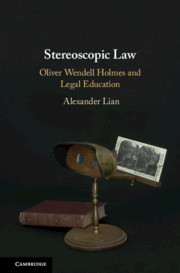Book contents
- Stereoscopic Law
- Stereoscopic Law
- Copyright page
- Dedication
- Epigraph
- Contents
- Preface
- Acknowledgements
- Introduction
- Part I Law and the Legal Profession
- Part II The Inner Path of the Common Law
- Part III The Purely Legal Point of View
- Part IV Thirteen Ways of Looking at the Bad Man
- Part V The Theory of Legal Study
- Conclusion
- Index
Part V - The Theory of Legal Study
Published online by Cambridge University Press: 23 January 2021
- Stereoscopic Law
- Stereoscopic Law
- Copyright page
- Dedication
- Epigraph
- Contents
- Preface
- Acknowledgements
- Introduction
- Part I Law and the Legal Profession
- Part II The Inner Path of the Common Law
- Part III The Purely Legal Point of View
- Part IV Thirteen Ways of Looking at the Bad Man
- Part V The Theory of Legal Study
- Conclusion
- Index
Summary
Both Holmes and Langdell recognized the primacy of procedure but differed in how they understood the development of legal doctrine from that common starting point. This part begins by exploring those differences and their implications for legal pedagogy. The rise of the modern law school necessitated the reformulation of law itself. Holmes articulated his basic conception that the legal profession had to refine its sense of the different interests at stake and how they could best be proportioned. From first to last Holmes sought for law (and lawyers) to grow more civilized. He objected to traditional shibboleths regarding the importance of a university education or of using the Roman civil law or morality (such as some version of Natural Law) as a propaedeutic. Holmes had faith in the effort to structure through law a civilization still coming into its own. He also believed law should become its own discipline, building from within the practice a greater comprehension of law’s effects. The part concludes by showing that Holmes’s attempts to unify law as a discipline were ill-fated but the same result could be achieved by viewing law in 3D, that is, stereoscopically.
Keywords
- Type
- Chapter
- Information
- Stereoscopic LawOliver Wendell Holmes and Legal Education, pp. 293 - 487Publisher: Cambridge University PressPrint publication year: 2020



